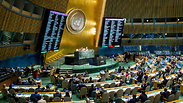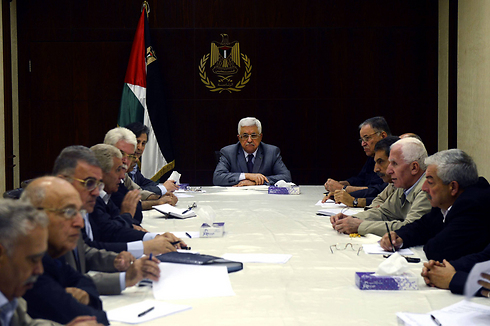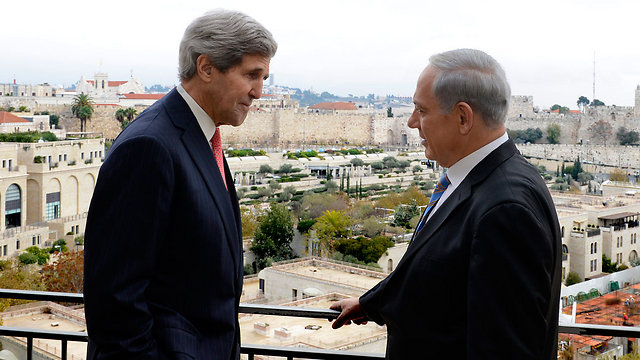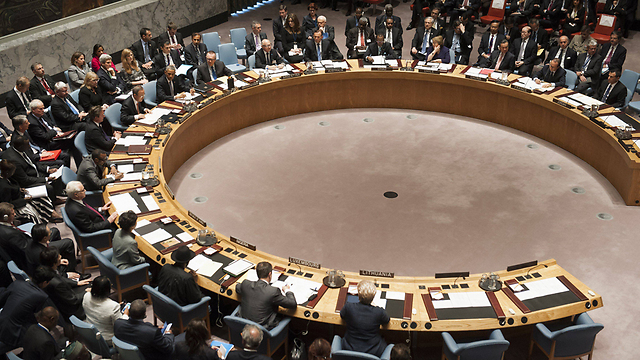
Palestinians to submit draft resolution to UN later this week
Israel hopes the US will veto moves at the UN to set a time frame for Israeli withdrawal from West Bank, East Jerusalem, but US official says its too early to determine Washington's stance.
The Palestinian leadership decided on Sunday to submit their draft resolution setting a deadline to Israeli withdrawal from the West Bank to the UN Security Council on Wednesday. They also decided to continue security cooperation in Israel despite calls to do so following the death of Palestinian minister Ziad Abu Ein.
The draft resolution will be submitted by Jordan, who is a temporary member of the Security Council.
The Palestinian draft resolution calls on Israel to withdraw from the West Bank and East Jerusalem by November 2016. The resolution also calls for a Security Council recognition of a Palestinian state within the 1967 borders.
France, Britain and Germany are discussing another proposal, which the Palestinians said they were willing to accept if an agreement is reached on its wording by Wednesday.
US Secretary of State John Kerry will meet Prime Minister Benjamin Netanyahu in Rome on Monday to discuss the various proposals on the topic that are circulating at the United Nations.
Later on Monday, Kerry will travel to Paris for talks with European counterparts and then on to London to meet Palestinian chief negotiator Saeb Erekat and a delegation from the Arab League, who will urge the United States not to use its UN Security Council veto to block the proposals.
Netanyahu, who is in the middle of campaigning for a March election, will also meet Italian Prime Minister Matteo Renzi along with Kerry.
"I will tell both of them that Israel stands, to a great extent, as a solitary island against the waves of Islamic extremism washing over the entire Middle East," Netanyahu said on Sunday in public remarks to his cabinet.
The hastily-arranged meetings suggested urgency in America's drive to manage efforts among Security Council members to draft a new proposal before Israeli elections in March. Kerry said on Friday he wanted to defuse tensions during the talks.
A senior Western diplomat said the Europeans were aiming for a consensus resolution devising a binding, unspecified, time frame and felt the Americans were now open to that possibility.
"There is a window of opportunity now, there is a willingness from them to consider options at the Security Council," the diplomat said.
But a senior US State Department official said Washington had not yet decided a Security Council resolution was the right way to go.
"These things are all very much in flux, it's not as if we're being asked to take a position on any particular Security Council resolution right now. It would be premature for us to discuss documents that are of uncertain status right now."
Palestinian move a 'provocation'
Israeli officials stressed that the Palestinians were hardening their positions in an attempt to cause the Netanyahu-Kerry meeting to fail.
Jerusalem estimates that if the Palestinians demand a vote on the resolution by the end of December, they won't have the necessary majority (nine out of the 15 member states) to pass the resolution, and in such a case the Americans won't need to veto the decision. But if the vote is held after January 1, it's likely the Palestinians can reach the necessary majority, putting the Americans in a dilemma on whether or not to use their veto power.
The Israeli officials said the Palestinian move was a provocation meant to increase pressure on the Americans and to embarrass them over the question of whether or not to veto the proposal.
The Americans will try to offer a softened version that will be acceptable to all parties, but the Palestinians will likely refuse to accept anything less than their demand to set a deadline for Israeli withdrawal.
It is also possible the Palestinians want the US to veto the resolution, to lay the foundation for them to turn to the ICC and file a suit against Israel for its settlement construction.
US seeks coordination
Strategic Affairs Minister Yuval Steinitz told reporters: "I assume an anti-Israeli proposal will draw a US veto. That's how it's always been, and that's what we hope will happen."
But Foreign Minister Avigdor Lieberman, speaking on Army Radio, said it appeared the United States "is not eager to use its veto" on the Palestinian statehood issue but was seeking "maximum coordination" with Netanyahu.
The Palestinians have repeatedly threatened to turn to the International Criminals Court at the Hague with request to investigate Israeli leaders for war crimes if the UN resolution doesn't pass, or is vetoed by the US.
Netanyahu and Washington have clashed frequently over Israeli settlement in the West Bank and East Jerusalem, territory Israel captured in the 1967 Six-Day War, leading to Israeli media speculation that a frustrated US could soften its opposition to unilateral statehood steps.
The senior US official said the common objective was to reduce tensions and try to coordinate with the various parties.
"We all want to keep open the hope of a two-state solution and we all want to prevent to the best of our abilities an escalation of the violence on the ground," the official said.
Unilateral efforts at the UN by Palestinians to form their own state in the West Bank and the Israeli-blockaded Gaza Strip, with East Jerusalem as its capital, follow the collapse in April of peace negotiations with Israel brokered by Kerry.
If the United States pushes the Europeans to wait until after Israel's elections, the Jordanians could put forward the Palestinian drafted resolution for a vote in January. Netanyahu said the resolution and its two-year deadline were dangerous.
"This will bring the radical Islamic elements to the suburbs of Tel Aviv and to the heart of Jerusalem," he told his cabinet. "We will not allow this. We will rebuff this forcefully and responsibly. Let there be no doubt, this will be rejected."
He said Israel now faced a possible diplomatic offensive "to force upon us" such a withdrawal within two years.
The US official indicated Washington did not think the Palestinian draft was acceptable.
"The Palestinian draft through the Jordanians contains a hard deadline for the withdrawal from the West Bank of two years, so that is not the way we would look at handling a very complicated security negotiation by simply mandating a flat deadline of two years," the official said.
Israeli officials, who asked not to be identified, said Israel was wary of any resolution that would lay down a timetable for either talks or a withdrawal.
Netanyahu has said rocket fire from the Gaza Strip during a 50-day war with Hamas militants in July and August highlighted the risks Israel could face in handing over more Palestinian territory.
In Jerusalem, violence has surged in recent months because of a dispute over access to a holy site. Eleven Israelis and twelve Palestinians, including those who were committed terror attacks in Jerusalem and Tel Aviv, have been killed.
In Gaza, Hamas paraded some 2,000 of its armed fighters and truck-mounted rockets on Sunday, marking its 27th anniversary with its biggest show of force since the end of the Gaza war this summer.
Reuters contributed to this report.













